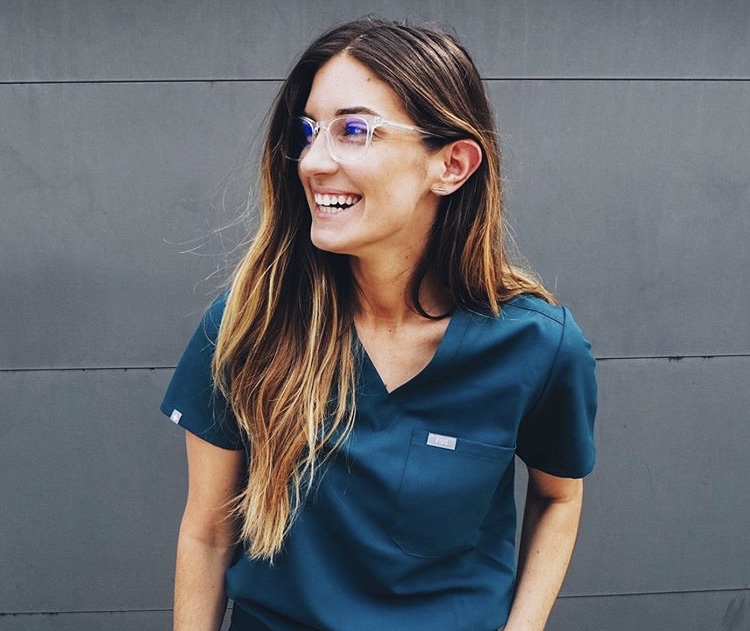FNP - Why I am Going Back to School
/From RN to FNP + DNP Student
what this all means and why I’m going back to school
As you may have read in my Why I Became a Nurse post, I have wanted to go into healthcare for as long as I can remember. Although my journey to nursing was somewhat unconventional, I entered the field with early intentions of continuing my education to become a Family Nurse Practitioner (FNP).
Now starting my second semester of the Doctorate of Nursing Practice (DNP) program at the University of Illinois at Chicago (UIC) to become a FNP (terrifying but exciting), I wanted to clarify what this all means and answer a few questions on why I decided to go back to school. Because really, after 19 years of education, who wouldn’t want a few more…right?
Before we dive into the hows and whys I chose the FNP route, let’s clarify a few confusing points about nursing careers & continuing nursing education.
WHAT’S THE DIFFERENCE BETWEEN A NURSE (RN) AND NURSE PRACTITIONER (NP)?
What nurses (RNs) do is nothing short of extraordinary and this really deserves a post of its own, but for the sake of simplicity, RNs work in patient-centered roles carrying out procedures, treatments, and medications ordered by a provider (physician, physician assistant, or nurse practitioner). They work hand-in-hand with patients- assessing, observing, monitoring, educating and advocating for them, while ensuring their care is safe, competent and thorough.
Nurse Practitioners (NPs) are Advanced Practice Registered Nurses, nurses that have continued school to be able to examine, diagnose, order and prescribe medications. Specific rules and regulations however, depend on the state in which the NP is licensed in and determines their scope of practice. NPs bring a comprehensive and holistic approach to health care, with an emphasis on disease prevention and health promotion. There are several options for NP students to specialize in a chosen patient population: acute care, adult/gerontology, pediatrics, neonatal, emergency, psych, women’s health, midwifery and my chosen focus- family practice.
WHAT IS A FAMILY NURSE PRACTITIONER (FNP)?
Of the population focuses just listed, family is the most common specialty for nurse practitioners to advance in. FNPs provide a wide range of family-focused health care services to patients of all ages including infants, adolescents, adults and seniors. You can think of an FNP as your Primary Care Provider.
Focusing on disease prevention and health promotion, FNPs see and examine patients, maintain records, order tests, prescribe medications (again, rules and restrictions depend on licensing state), develop treatment plans, educate patients and manage acute and chronic illness for patients across the lifespan. They practice in a variety of settings including community health centers/clinics, private practices, urgent care facilities, health care systems, schools, universities and beyond.
WHY DID YOU DECIDE FNP?
Working at the bedside on a hospital inpatient unit can be a struggle for any nurse- the exhausting hours, being on your feet, working overnight and on holidays, the demanding patient load (I could go on)...but working at the bedside was extra hard for me. I constantly questioned what lifestyle modifications could have prevented my patients from being admitted in the first place. Every discharge frustrated me beyond belief, knowing how many community, social, economic and systemic barriers existed for my patients once they got out. Yes, I was keeping patients alive, comforting them and educating them (with the little time I had), but I felt like I wasn’t even scratching the surface. Our healthcare system was failing these patients and missing a huge part of the picture…maybe even missing the whole point.
This line of thinking was nothing new for me. As I said in the beginning of this post, I had an inkling to become an FNP before even becoming a nurse. Growing up on the near-west side of Chicago, I was exposed to the harsh realities of health disparities early on. Before nursing school, I then worked in clinical research seeing the same problems among my patients, the undeniable healthcare disparities and our terribly broken system. Later on, my public health rotation in nursing school further pushed me in this direction and confirmed my FNP calling.
I felt at home in community clinics, lived for health promotion projects and idolized my instructors and the badass nurse practitioners. They were out in the community providing care for those who needed it most.
photo by Madi Hebner
On a lighter note, by the likes of this blog I’m sure you can tell I have a LOT of interests. I love travel, beauty, wellness, sustainability, gardening, cooking, music…and everything in between. The same is true in healthcare. I crave variety and honestly, I get bored pretty easily. With family practice, I will have the opportunity to see patients of all ages, backgrounds and medical histories, with a range of healthcare needs.
WHY ARE FNPs IMPORTANT TO HEALTHCARE?
Our country is facing increasing rates of chronic disease, cancer, stress, anxiety, and depression, in addition to more pollutants and toxins than ever in our food, air and water. By providing long-term care for patients, managing disease, and providing preventative education, I truly believe FNPs can aid in lessening our country’s primary care crisis. Overall, this is my #1 reason for choosing this path.
WHY THE DNP? IS IT NECESSARY?
All NPs must complete at least a master's degree and have advanced clinical training beyond their initial RN preparation. The doctorate, or DNP is the furthest step in clinical education. It is the ultimate practice-focused degree awarded to nurses who want to achieve the highest level of proficiency in delivering complex care. With additional preparation in research, social determinants of health and healthcare systems, DNPs can also embrace roles that don’t involve direct patient care such as working as administrators, executive leaders, informaticists, health policy specialists, public health advocates, nurse educators and more.
For now, the DNP is not required but it establishes the highest level of credibility for clinical nurses, something I knew eventually I would want in my career. Better to do it now than later in my opinion!
WHY UIC?
Again, I grew up on the near west side of Chicago, a few blocks away from UIC’s medical campus. My preschool is actually a rocks-throw away from the College of Nursing so yes, I will admit there is a hint of nostalgia and an inexplicable desire to learn and practice in the community that shaped me.
The DNP Program here is one of the top ten programs in the country, and since I completed the Generalists Master’s Program at UIC I had a few doctoral credits already under my belt…so this was a no-brainer. Their faculty is beyond impressive, and during my masters I grew to admire some of my professors on many levels. To give you my application answer (which is genuinely accurate), “I believe the environment, education, and faculty here will best prepare me to be a culturally sensitive and competent provider”.
In addition, I recently transitioned into a faculty role at the college as a clinical instructor. Apparently I cannot get enough of this place!
WHERE DO YOU SEE YOUR CAREER IN 5 YEARS?
I am a Chicago girl through and through, so I envision myself working in urban community clinics or health centers in any of the medically underserved areas close by. There is so much I hope to accomplish in my career- from primary practice to research and teaching, to addressing social justice issues including food security and gun violence in relation to health. I hope with the DNP I can advocate for patients in the primary care settings and legislative arena. I am also a certified yoga instructor and have a huge interest in childhood obesity and the advancement of urban farms to meet community nutritional needs. Remember when I said I have many interests?? We will see how all of that can fit in!
Overall, although my time at the bedside has provided an excellent foundation for nursing practice, as an FNP I know I can truly find ways to close the gap and work towards equal primary healthcare needs. In five years I hope I can say I am truly making a difference.
Nurses are an incredible breed. I have said it before and I will say it again: there are few career choices as selfless, honorable, and rewarding as becoming a nurse. I will always be grateful for a set of skills that can truly help others, and the endless opportunities to affect individuals, communities and the world.
If you are thinking about pursuing a career in nursing, as an NP or FNP please reach out with any questions, thoughts, or ideas. Drop me a line in the comments or find me on social media, I’d love to hear from you!
XOXO,
Jac





















